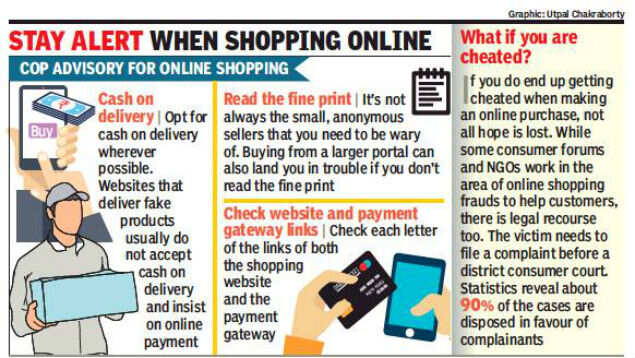
KOLKATA: Shopping and paying online without verification can cost you dearly. Cops have now revealed that a gang of fraudsters used crucial customer data of an e-commerce platform to dupe the shoppers of lakhs since December 2018. The police have now established that customers’ data — including their contact and order details — was being sold for as little as Rs 10-20.
“We have found that one of the company’s employees, who is no longer with it, was selling the crucial customer data to the gang. This meant that the accused had secured not just the phone numbers and email IDs of customers, but also the details of their purchases. Hence, when the gang members contacted the customers, the latter could not suspect anything amiss,” an officer said.

Cops made the revelation after they arrested the fourth suspect, Vishal Ali alias Rahul Gupta alias Samar, in the phishing case days involving an e-commerce giant. A joint team of the Hare Street police and the anti-fraud section of the detective department made the arrest on Thursday. “We have identified a few more suspects who were trying to strike before Durga Puja. They will be nabbed soon,” joint CP (crime) Murlidhar Sharma said.
Police said the accused used to call up victims posing as agents and sent e-mails, offering attractive Independence Day and Durga Puja discounts. Once the victims clicked on the link, it led them to a fake website designed to appear as the genuine page of the shopping platform. Suspecting nothing amiss, they would then pay on the website. The amount would get deposited in the gang’s website, after which the accused would stop all communication.
“A case of cheating and fraud was lodged earlier this year at the Hare Street police station based on a complaint by the firm. It had alleged that since December 2018, the accused duped customers by promising them expensive gifts through lucky draws and jaw-dropping discounts,” said Joint CP (Crime) Murlidhar Sharma.
Cops said the accused were experts in phishing — a form of online fraud, in which a fraudster masquerades as a reputable entity or person over email or other communication channels. He then uses phishing emails to distribute malicious links or attachments that can perform a variety of functions, including the extraction of log-in credentials or account information from victims.
Cops said shoppers must go for cash-on-delivery and check the credibility and link of the website and the mode of payment.
“We have found that one of the company’s employees, who is no longer with it, was selling the crucial customer data to the gang. This meant that the accused had secured not just the phone numbers and email IDs of customers, but also the details of their purchases. Hence, when the gang members contacted the customers, the latter could not suspect anything amiss,” an officer said.

Cops made the revelation after they arrested the fourth suspect, Vishal Ali alias Rahul Gupta alias Samar, in the phishing case days involving an e-commerce giant. A joint team of the Hare Street police and the anti-fraud section of the detective department made the arrest on Thursday. “We have identified a few more suspects who were trying to strike before Durga Puja. They will be nabbed soon,” joint CP (crime) Murlidhar Sharma said.
Police said the accused used to call up victims posing as agents and sent e-mails, offering attractive Independence Day and Durga Puja discounts. Once the victims clicked on the link, it led them to a fake website designed to appear as the genuine page of the shopping platform. Suspecting nothing amiss, they would then pay on the website. The amount would get deposited in the gang’s website, after which the accused would stop all communication.
“A case of cheating and fraud was lodged earlier this year at the Hare Street police station based on a complaint by the firm. It had alleged that since December 2018, the accused duped customers by promising them expensive gifts through lucky draws and jaw-dropping discounts,” said Joint CP (Crime) Murlidhar Sharma.
Cops said the accused were experts in phishing — a form of online fraud, in which a fraudster masquerades as a reputable entity or person over email or other communication channels. He then uses phishing emails to distribute malicious links or attachments that can perform a variety of functions, including the extraction of log-in credentials or account information from victims.
Cops said shoppers must go for cash-on-delivery and check the credibility and link of the website and the mode of payment.
World Cup 2019
Trending Topics
LATEST VIDEOS
More from TOI
Navbharat Times
Featured Today in Travel
Quick Links
Lok Sabha Election Schedule 2019Lok Sabha Election NewsDelhi Capitals teamMI team 2019Rajasthan Royals 2019RCB team 2019Maharashtra Lok Sabha ConstituenciesBJP Candidate ListBJP List 2019 TamilnaduShiv Sena List 2019AP BJP List 2019Mamata BanerjeeBJP List 2019 MaharashtraPriyanka GandhiBJP List 2019 KarnatakaAMMK Candidate List 2019BJP List 2019 WBLok Sabha Elections in Tamil NaduBSP List 2019 UPNews in TamilLok Sabha Poll 2019Satta Matka 2018PM ModiMahagathbandhanNagpur BJP Candidate ListChandrababu NaiduTamil Nadu ElectionsUrmila MatondkarNews in TeluguMadras High CourtTejashwi YadavArvind KejriwalTejasvi SuryaPawan KalyanArvind KejriwalYogi AdityanathJaya PradaSatta King 2019Srinagar encounter
Get the app








